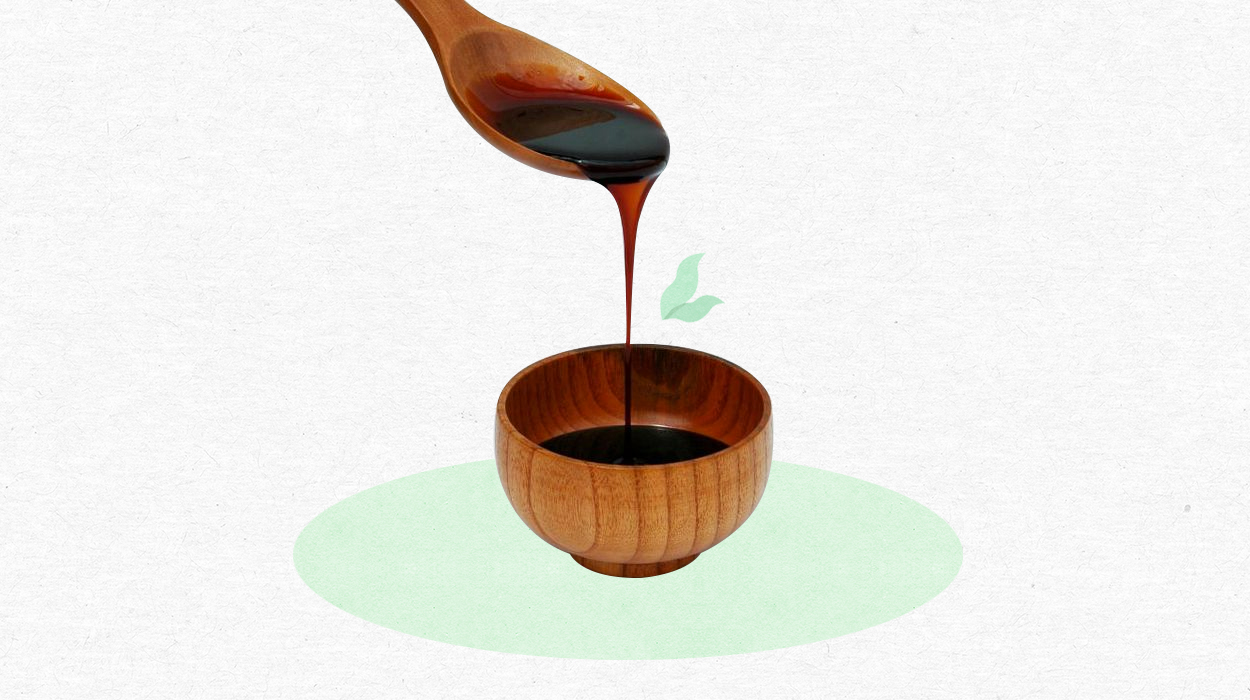 Expert's opinion
Expert's opinion
Expert's opinion
The article is a subjective view on this topic written by writers specializing in medical writing.
It may reflect on a personal journey surrounding struggles with an illness or medical condition, involve product comparisons, diet considerations, or other health-related opinions.
Although the view is entirely that of the writer, it is based on academic experiences and scientific research they have conducted; it is fact-checked by a team of degreed medical experts, and validated by sources attached to the article.
The numbers in parenthesis (1,2,3) will take you to clickable links to related scientific papers.
Is Molasses Vegan? Learn Everything About Molasses With Nutrition Experts In 2024

Is molasses vegan? That’s the question on the minds of many vegans who want to ensure their dietary choices align with their vegan culture. Embracing a vegan diet has become increasingly popular due to its treatment of animals, environmental sustainability, and potential health benefits.
Molasses is a dark and flavorful syrup derived from sugarcane or sugar beets. However, molasses is not always a vegan food. As a byproduct of sugar production, it may have been processed using bone char, which most strict vegans avoid.
Nonetheless, molasses can complement a vegan diet with its exceptional nutritional profile if you choose organic molasses. Rich in vitamins and minerals and typically gluten-free, molasses is a valuable source of essential nutrients. Let’s see what more molasses have to offer.
Is Molasses Considered Vegan?
No, commercial molasses is not considered vegan. The only vegan molasses option is organic molasses.
Molasses is a byproduct of the sugar refining process of sugarcane or sugar beet juice. It is the syrup left behind after the sugar crystals have been extracted. And cane sugar is not always vegan-friendly.
Since molasses is derived from the sugar refinement process, there is no way to tell whether the sugar used is vegan-friendly or not. Thus, many strict vegans avoid molasses.
Is Molasses Vegan-Friendly?
Yes, organic molasses is considered vegan-friendly,[1] while commercial molasses might not be. Commercial molasses might not be vegan-friendly because some sugar manufacturing companies might still use bone char[2] in the sugar-making process. However, this is relatively uncommon nowadays.
Plant-based eating revolves around consuming fresh fruits and veggies, grains, legumes, nuts and seeds, and products derived from plant-based ingredients, such as green powders. Vegan diets exclude all animal products, which might also include commercial molasses.
If you want to change your diet to vegan, you have probably searched for alternatives to your everyday meals. Organic molasses is an alternative to sweeteners like table sugar and offers some health benefits,[3] such as valuable vitamins and minerals.
This makes organic molasses a wholesome option to incorporate into a balanced vegan diet. However, it’s still a sugar-derived sweetener and should be consumed in moderation.
When Is Molasses Not Vegan?
Molasses might not be considered vegan for the following reasons:
- Processing additives: Some manufacturers may add processing additives or clarifying agents during organic molasses production, which might not be vegan.
- Cross-contamination: Cross-contamination is possible in facilities where animal-based and plant-based products are processed.
- Cane sugar processing: In the U.S., cane sugar processing might involve animal bone char in the refinery process, thus making cane sugar molasses a non-vegan option. There is no way of knowing whether vegan-friendly beet sugar was used instead of cane sugar in the molasses production process. Organic molasses is the only true vegan option because cane sugar producers cannot use bone char for certified organic sugar.
To ensure that molasses is genuinely vegan, it’s best to opt for reputable brands that explicitly state their commitment to vegan practices, check the ingredient label, and reach out to the manufacturer for any doubts. However, the surest way to know you are getting vegan molasses is to purchase the certified organic version.
What Is Molasses?
Molasses is a dark, and viscous thick syrup-like substance. You may have come across it as an alternative to sweeteners. It is a byproduct of the sugar industry as it is derived from the refined sugar-making process. It is obtained after the extraction of sugar crystals from the plant’s juice.
Molasses has a distinctive bittersweet taste and dark color, which comes from residual sugars and other compounds that remain after the sugar extraction process.
Molasses is commonly used in baking and cooking. It is also used in various foods, beverages, and sauces. Molasses also contains essential vitamins and minerals[4] like iron, calcium, magnesium, and vitamin B6.
How Is It Made?
Molasses is made from the sugar refining process of sugar cane or sugar beets. The journey begins with harvesting sugarcane or sugar beets, which are crushed or shredded to extract sugarcane juice.
The extracted juice undergoes clarification, where impurities are removed through liming — a process involving the addition of lime to coagulate unwanted particles. The liquid is then heated to evaporate excess water, leading to concentration and thickening.
As sugar crystals form, they are separated from the liquid portion, creating molasses. The final product may vary in color and flavor intensity depending on the type of sugar plant used and the refinement process.
The sugar cane juice is boiled in stages, yielding different types of molasses in each stage. For example, blackstrap molasses is what is left at the end of the refinery process after the sugar cane juice has been boiled at least three times.
Organic molasses is made from organic sugar cane following similar manufacturing processes.
Is Molasses Healthy?
Molasses is considered a healthy vegan alternative. To back this up, it offers numerous health benefits. Here are some:
- Rich in minerals: Molasses is a natural source of essential minerals. Some minerals in molasses include iron,[5] calcium, magnesium, and potassium. These minerals are crucial in various bodily functions and in maintaining optimum health.
- Antioxidant properties: Some types of molasses, like blackstrap molasses, contain antioxidants.[3] Antioxidants help neutralize harmful free radicals in the body. They also protect our cells from oxidative damage.
- Lower glycemic index: Compared to refined sugar, molasses has a lower glycemic index[6] — a measure of how quickly a food raises blood sugar levels. However, its glycemic index is still 70, classifying it as a high glycemic food and thus able to spike blood sugar. Since regular white sugar has a glycemic index of 100, molasses will not spike blood sugar as much.
So, if you are working on starting vegan meal replacements, using molasses as a sweetener can enhance the nutrient profile of your meals. If you use vegan meal delivery options, be sure to check they use organic molasses.
Varieties Of Molasses
There are several varieties of molasses. Each of them has distinct characteristics and uses. Their differences arise from the specific sugar extraction process, the number of times the juice is boiled, and the degree of sugar crystal removal.
Here are the most common types of molasses based on their production process:
- Light molasses: Also known as first molasses or Barbados molasses, this variety is obtained from the first boiling of the sugarcane or sugar beet juice. It is lighter in color and milder in flavor compared to other types.
- Dark molasses: Also known as second molasses, this type is derived from the second juice boiling. It has a darker color and a more robust flavor than light molasses.
- Blackstrap molasses: This is the darkest and most concentrated type of molasses. It is obtained from the third boiling of the juice. It has a slightly bitter flavor. Blackstrap molasses is frequently used as a nutritional supplement and valued for its potential health benefits.
Molasses may also be classified as sulfured molasses or unsulfured molasses, depending on whether it’s been treated with sulfur dioxide.
Conclusion
So, is molasses vegan? Most likely, but not always. If you follow a strict vegan diet, this syrup may not align with your principles, particularly those committed to the true vegan philosophy of not exploiting animals.
If you are vegan and looking for a greater variety of vegan meals and flavors, try organic molasses as this will definitely be vegan. You’ll even get some essential nutrients, but be aware that it is still high in sugar and should be consumed moderately.
Frequently Asked Questions
Yes, unsulfured organic molasses is vegan-friendly, as it is derived from plant sources without any animal products or processing.
Yes, in moderation. Molasses benefits vegans as a natural sweetener rich in minerals like iron, calcium, and magnesium.
Yes, dark molasses is vegan if it is made from sugar beets or certified organic sugar cane.
Commercial molasses is usually made from sugar cane, which might be processed with bone char. Hence it might not be vegan-friendly as it uses animal products in the refinery process. Only organic molasses is definitely vegan.
Molasses is the liquid leftover from the boiling process of refined sugar production.
+ 6 sources
Health Canal avoids using tertiary references. We have strict sourcing guidelines and rely on peer-reviewed studies, academic researches from medical associations and institutions. To ensure the accuracy of articles in Health Canal, you can read more about the editorial process here
- Dimitra Rafailia Bakaloudi, Halloran, A., Rippin, H., Artemis Christina Oikonomidou, Theodoros Dardavesis, Williams, J., Kremlin Wickramasinghe, Breda, J. and M. Chourdakis (2021). Intake and adequacy of the vegan diet. A systematic review of the evidence. Clinical Nutrition, [online] 40(5), pp.3503–3521. doi:https://doi.org/10.1016/j.clnu.2020.11.035.
- Singh, K., Ram Bharose, Sudhir Kumar Verma and Vinay Kumar Singh (2012). Potential of powdered activated mustard cake for decolorising raw sugar. Journal of the Science of Food and Agriculture, [online] 93(1), pp.157–165. doi:https://doi.org/10.1002/jsfa.5744.
- Environmental Technology Reviews. (2021). Composition, valorization and therapeutical potential of molasses: a critical review. [online] Available at: https://www.tandfonline.com/doi/abs/10.1080/21622515.2021.1892203.
- Usda.gov. (2023). FoodData Central. [online] Available at: https://fdc.nal.usda.gov/fdc-app.html#/food-details/168820/nutrients.
- Jain, R. and Padma Venkatasubramanian (2017). Sugarcane Molasses – A Potential Dietary Supplement in the Management of Iron Deficiency Anemia. Journal of Dietary Supplements, [online] 14(5), pp.589–598. doi:https://doi.org/10.1080/19390211.2016.1269145.
- admin (2021). Molasses – Glycemic Index, Glycemic Load, Nutrition Facts. [online] Glycemic Index Guide. Available at: https://glycemic-index.net/molasses/.



